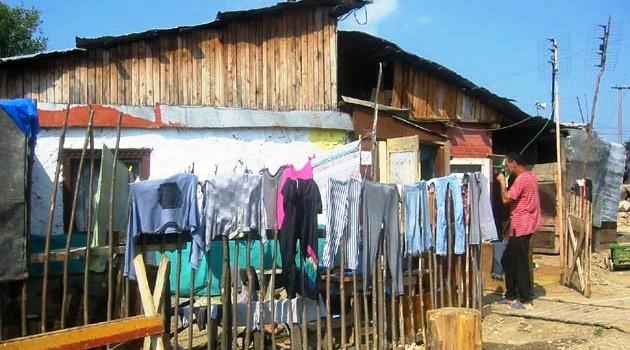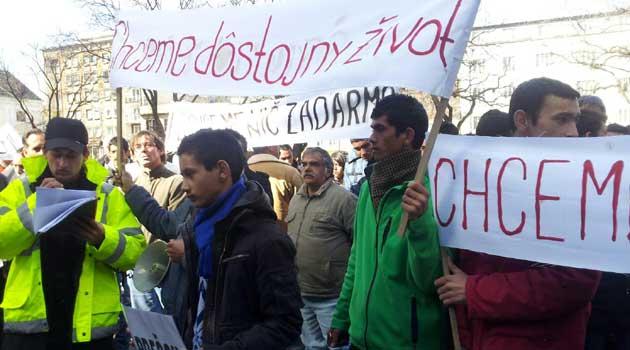Czech NGO's hands tied on hopeless situation of Romani migrants from Slovakia

In recent weeks the field social workers at the Prague branch of the People in Need association have been confronted with the desperate situations of Romani people from Slovakia who, in fear for their lives, decided to leave their home country with the unclear notion that they might find assistance in Prague. The following is a description of a dramatic two days in the life of the Prague branch of that NGO, as described by one of its social workers.
Day One
A report from the Association for Integration and Migration (Sdružení pro integraci a migraci – SIMI) is delivered to the coordinator of our field social workers containing a brief description of the situation of a family who had traveled to the Czech Republic from a settlement near Košice in Slovakia. In the email, SIMI provides basic information and asks our organization to participate in addressing the complex, urgent situation of a 16-member family who have spent their last savings on the train tickets to Prague they believed would find them assistance and safety.
SIMI staffers had already arranged to accommodate the parents and four of their children in the emergency room of the Kolping House for one week. The rest of the family, however, had to spend a whole night outside without shelter.
When these 10 people arrived at our office in the Smíchov quarter of Prague, exhausted and hungry, the oldest female member of the family began to explain the dramatic circumstances of their fleeing Slovakia. Allegedly a conflict arose between the men in the settlement and several families were assaulted – this particular family’s house was demolished and they were forced to leave the settlement under the threat of more violence.
The female family members reported the incident to the municipal police in Košice, but they were not interested and told the Roma they were to blame for their own situation. The family believed there was no other option than to set off on a journey to Prague, with a vision of a better life in the Czech Republic and the protection they imagined they would find here.
The Aliens’ Police gave them contact information for SIMI and for our Prague branch. Our first task was primarily to ensure the children had the opportunity to access basic hygiene facilities, food and a bed for the night.
Unfortunately, however, we encountered many "official" obstacles, even from the few organizations providing crisis assistance to people in Prague – as an illustration we can mention one group’s internal regulation according to which persons younger than 18 could not be allowed inside their facilities, and another rule preventing the carrying of an NGO’s food aid away from its premises. The hours flew by and the number of organizations contacted to provide accomodation rapidly accumulated without any result – it seemed impossible to find even the most basic emergency accommodation for 10 people who were unable to pay that same day.
The situation was even more dramatic in that there were six children in that 10-member group, a woman in the eighth month of pregnancy, and another woman suffering from a psychological disorder who could not access her medication. RIAPS, a facility providing emergency beds to patients with psychiatric disorders, would not accept her because she did not have an international health insurance card with her, and the embassy of the Slovak Republic said that it had no competency to intervene in such a situation; the option of taking advantage of a refugee facility could not be considered, because within the European Union people are not expected to flee their home countries, and such facilities are exclusively intended for citizens of non-EU countries.
Instead of caring for the health and safety of people forced to leave their home country, the possible negative impact of such arrivals on the society of the state receiving them is what the law addresses. Alternatives for such people do not exist because, as refugees from one EU Member State to another, they are not supposed to formally exist either.
Such people, however, were sitting in our office – they were hungry, and they were slowly losing hope. The only thing we did manage to agree on with the Prague 5 Labor Office was the possibility of arranging extraordinary immediate financial aid for them, but given that it was already after business hours, a meeting could not take place until the following day.
In reality, therefore, these 10 members of the family risked spending another cold night on the streets. Our staffers also began to feel exhausted and powerless, and several times we consulted management about the option of letting the family sleep in the modest basement space connected to our office.
Fortunately, at the last moment, we received financial aid from a private donor and were able to pay for the children and the pregnant woman to spend one night at a residential hotel and to buy a few basic groceries. A bed was found for the mentally ill woman at a facility run by a charity organization of the Archdiocese, the St. Theresa shelter.
Unfortunately, the only member of the family we couldn’t house was a man who had to spend yet another night on the street, so we at least loaned him a sleeping bag. We agreed to pick everyone up the next morning, to go together to the local authority, and to send the family back to Slovakia after we had first arranged aid for them on that end.
Day Two
As per our agreement, we picked the clients up in the morning and brought them back to our office, after which all of the adults accompanied us to the local authority to get the money for their return trip to Slovakia. Our Mothers’ Club was taking place in the club space of our offices, and when our clients saw the impoverished family, they collected money among themselves to buy them groceries, even though they themselves all are from families who often have no resources to draw on.
We then took the migrant children to our preschool club in the Prague 8 neighborhood. That afternoon we were faced with another big task, that of handing the family over to an organization in Slovakia providing social services, through so-called "networking".
After several hours we found ourselves in a similarly desperate situation as we had the day before in our efforts to arrange a bed for the night for the family. Despite the assistance provided by our Slovak colleagues from the Bratislava branch of People in Need, we could not find an organization able to offer a solution for this family.
In the meantime we contacted the primary school in Košice where several of the children were enrolled to explain their absence. One surprising thing we learned was the fact that in Slovakia there are schools intended exclusively for Romani children (see the summary of the 2013 report by the Slovak Public Defender of Rights, JUDr. Jany Dubovcová).
Romani children in Slovakia are not only excluded into these "Romani schools", but they are also excluded from the standard education system. Because of this they cannot continue their educations, which adversely influences their fates.
The situation of Romani education in Slovakia, compared to the Czech Republic, is even more serious, as discrimination is performed through the systematic creation of "Romani schools", facilities where the right of an ethnic minority to education in their own language is not upheld either. Moreover, a further exclusion occurs within these schools, an even more serious one, that of being removed from the standard education system into the "special" one; Romani children educated this way have practically no opportunity to continue their studies and cannot even enroll into secondary education.
On that second day we contacted almost 25 organizations, local authorities, parish offices and state bodies responsible for issues of families and housing. We succeeded in negotiating potential accommodation through a Greek Catholic charity organization in the town of Prešov, Slovakia, who told us that it had decided to provide accommodation to the mothers and the children and that they should travel there in person.
This was basically one of the most positive pieces of news we received during this whole process, as it indicated the hope of a viable solution. We also succeeded in finding the People in Need Community Center in the settlement of Petrovany, eight kilometers from Prešov; the family naturally did not want to return to Košice out of fear for their safety.
We gave the family the contact information for the local authority department involved in the issue of families and housing, contact information for the Greek Catholic charity, and contact information for the field social worker at the People in Need Community Center in Petrovany. We also informed the Bratislava branch of People in Need of our progress in resolving the situation.
We accompanied the family to the main train station in Prague. We gave them their tickets and bought food and water for their journey with the rest of the donated money.
What now?
We wrote up a report on the entire situation for the Office of the Government of the Slovak Republic for the Romani Community at the Slovak Interior Ministry in Bratislava. We provided Ms Dominika Gažová, the staffer for the Romani community, with the telephone number of the daughter of the most senior woman in the family.
Two weeks later that office let us know that they an opportunity to contact the family through their regional office in Košice. They would be focusing on the family’s difficult situation there and would keep us informed.
Collaboration with that authority was the only lifebuoy that contributed to resolving the situation both for us and for the members of the migrant family. However, after this experience, in my opinion the situation in Slovakia with respect to addressing the issue of Romani people is catastrophic.
This family turned to us because they were in fear for their lives – they were fleeing violence that had erupted in their settlement, inaction and lack of interest on the part of the state administration, and the absolute poverty that offers no hope of improvement. Proof of their desperation was their decision to travel with their children to Prague, a place about which they had only very vague notions and where they had no contacts.
Despite a fierce two-day effort by our social workers, we were unable to arrange any assistance for them other than that of sending them back to Slovakia with an unclear promise of aid. This is the consequence of a dismal policy that is extremely hazardous and racially discriminatory – not just in Slovakia, but in other EU countries.
